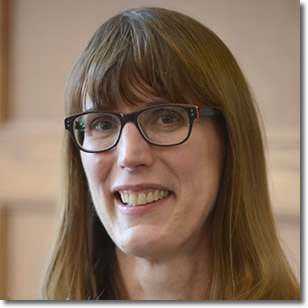2016–2017 IRP Webinar Series
IRP places a high priority on making knowledge and information available to interested parties. In addition to our on-campus seminar series, IRP offers regular online webinars on current research on poverty and social inequality in the United States. Register for upcoming webinars or watch recordings of past webinars.
Monetary Sanctions: Using Fines and Fees to Punish the Poor
July 19, 2017, 1:00–2:00 pm CDT/2:00–3:00 pm EDT
Featuring Alexes Harris

The growth of the U.S. criminal justice system over the last 50 years is by now well known, but the use of fines, fees, and other monetary sanctions as a form of punishment has only recently begun to receive attention. In this webinar, University of Washington sociologist Alexes Harris will discuss the use of monetary sanctions by municipal and state courts and how this form of punishment reinforces existing inequalities in the United States. Drawing on research from her 2016 book, Pound of Flesh: Monetary Legal Sanctions as Punishment for the Poor, Harris will describe how these kinds of fine- and fee-based punishments are used at the local level and how a different set of policies could lead to better outcomes for those involved with the criminal justice system.
Weighing the Benefits of a Universal vs. Targeted Child Safety Net
May 17, 2017, 1:00–2:00 pm CDT/2:00–3:00 pm EDT

Featuring Christopher Wimer and James Ziliak
This webinar will explore the merits of universal versus targeted approaches to improving the safety net: Christopher Wimer of Columbia University's Center on Poverty and Social Policy will discuss a plan for a Universal Child Allowance similar to that of many other developed countries, which has the potential to cut child poverty nearly in half. Then, James Ziliak of the University of Kentucky Center for Poverty Research will discuss a proposal that would convert the nonrefundable Child and Dependent Care Tax Credit to a refundable credit that would work in tandem with the EITC to improve child well being and to make work pay for low-income families.
Deaths of Despair: Drug, Alcohol, and Suicide Mortality in Small City and Rural America
April 26, 2017, 1:00–2:00 pm CDT

Featuring Shannon Monnat, Assistant Professor of Rural Sociology, Demography, and Sociology, Penn State University
Since 1999, nearly 2 million people living in the U.S. have died from causes related to drugs, alcohol, and suicide. The highest rates are among young and middle-aged non-Hispanic whites, especially those living in nonmetropolitan areas. This webinar will describe trends in drug, alcohol, and suicide mortality in the U.S., explore some of the potential explanations for why rates have increased over the past two decades and why these deaths are more prevalent in certain geographic areas, and discuss what it will take to counter these trends.
Economic Disadvantage in Rural America
April 12, 2017, 1:00–2:00 pm CDT
Featuring Brian Thiede, Assistant Professor of Rural Sociology and Sociology, Penn State University

Rural and small-town America has been slower to recover from the Great Recession than U.S. metropolitan areas. This webinar explores the general economic context in which rural Americans are embedded, with a focus on poverty and underemployment. It traces trends over recent decades, and explores possible causes (and solutions) to economic disadvantage in the rural United States.
Abandoned Families: Social Isolation in the Twenty-First Century
February 15, 2017, 1:00–2:00pm CST

Featuring Kristin Seefeldt
In this webinar, University of Michigan social work professor Kristin Seefeldt will talk about the economic and residential segregation facing many low-income workers, particularly African Americans, and how those factors limit their families' chances for upward mobility. Seefeldt will draw on research that appears in her new book, Abandoned Families: Social Isolation in the Twenty-First Century, and discuss a number of policy measures that have the potential to help vulnerable families get ahead.
Linking Data Science and Behavioral Science to Build Better Poverty Policy
January 18, 2017, 1:00–2:00pm CST (This webinar was originally scheduled for October 12, 2016.)

Featuring James Guszcza and Justin Sydnor
In recent years, researchers and policymakers have become more interested in applying "big data" and behavioral insights to understanding and responding to poverty, but often these two domains are thought of separately. In this webinar, James Guszcza, U.S. Chief Data Scientist at Deloitte Consulting, and Justin Sydnor, Associate Professor in the Department of Risk and Insurance at the University of Wisconsin School of Business, will explore how data science and behavioral science can be applied together to help build better poverty-related policies.
The Decentralization of the U.S. Safety Net

December 14, 2016, 1:00–2:00pm CST
Featuring Sarah Bruch, Marcia Meyers, and Janet Gornick
View Webinar | Read the Transcript
The safety net for working age adults and families is decentralized by design, allowing states wide discretion and producing large state-to-state differences in policies, benefits, and inclusiveness. In this webinar, Sarah Bruch, Department of Sociology, University of Iowa; Marcia Meyers, School of Social Work and Evans School of Public Affairs, University of Washington; and Janet Gornick, Graduate Center, City University of New York (CUNY) will draw on work that appeared in a recent IRP Discussion Paper to discuss the scope of this variation and the potential implications for U.S. safety net policies, poverty, and inequality.
Health and Economic Mobility

September 7, 2016, 1:00–2:00pm CDT
Featuring Rourke O'Brien and Atheen Venkataramani
View Webinar | Read the Transcript
New evidence suggests that rates of intergenerational economic mobility—a measure of economic opportunity—vary dramatically across US counties. How might inequality of opportunity influence individual and population health? And to what extent does health itself serve as a determinant of intergenerational economic mobility? In this webinar, Rourke O'Brien (La Follette School of Public Affairs at UW–Madison) and Atheendar Venkataramani (Massachusetts General Hospital and Harvard Medical School) will examine the interplay between health and economic opportunity and discuss the implications of this nexus for public policy.
Previous IRP Webinars: 2015–2016 | 2014–2015 | 2013–2014 | 2012–2013





